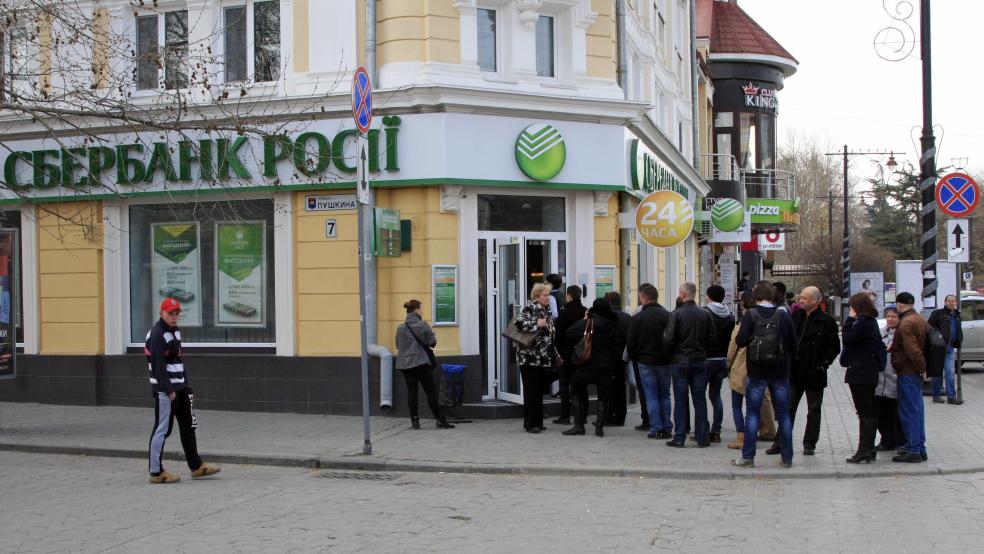Secretary of State John Kerry upped the pressure on Russia today, warning Russian President Vladimir Putin President, who has taken conciliatory steps in recent days, to stop violent separatists in eastern Ukraine or face new economic sanctions.
“We are in full agreement that it is critical for Russia to show in the next hours, literally, that they are moving to help disarm the separatists, to encourage them to disarm, to call on them to lay down their weapons and begin to become part of a legitimate political process,” Kerry said in Paris today.
Related: Putin's Oligarchs Are Key to War and Peace in Ukraine
Kerry’s economic threat is part of the Obama administration’s broader strategy to check the ambitions of Russia in Ukraine. The White House maintains that sanctions will bankrupt those in Putin’s inner circle, putting economic pressure on the oligarchs who give the Russian leader power.
“I wouldn’t, if I were you, invest in Russian equities right now, unless you’re going short,” then White House press secretary Jay Carney said in March.
The strategy worked for a while; in the wake of the Ukraine crisis, the Russian stock market tanked and foreign investment in Russia dried up.
However, as tensions in Ukraine have eased, the Russian economy has made a quiet comeback. It’s far from the lofty heights it reached before the crisis. However, since bottoming out in May, the RTS (Russian Trading System) Index has risen 33 percent, replacing much of the loss caused in the early days of the crisis.
And some of the best performers are the countries that the White House thought would be most impacted by sanctions. For instance, the Russian energy giant Rosneft has gone up 17 percent since Obama placed sanctions on Igor Sechin, its CEO. Another energy company, Novatek, has risen 37 percent since Treasury placed sanctions on its CEO, Gennady Timchenko. Gazprom, the state-owned energy giants, is up 30 percent since March, and 10 percent on the year.
Related: Does Putin Want to Carve Up Ukraine and Take the Spoils?
The market rally might be the reason for many of the conciliatory gestures Putin has made in recent weeks. He’s asked the Russian government to withdraw authorization that would have allowed Russian troops to operate in Ukraine. He’s also expressed support for the outcome of the Ukrainian presidential elections held last month.
However, these gestures do not mean that Putin is abandoning his regional ambitions. What’s happening in Ukraine is a replay of what happened after Russian invaded Georgia in 2008.
During that crisis, Russia provoked Georgian troops into engaging them, giving them a reason to invade. They quickly pushed back overmatched Georgian forcers, and occupied an area of the country where Russian speakers lived. He then threatened to invade deeper into the country, until withdrawing Russian troops while keeping an occupation force in northern Georgia, along the Russian border.
Related: Russia's Provocative New Act of Aggression in Ukraine
The same scenario is playing out in Ukraine. Russia trumped up a reason to enter Crimea. It occupied the peninsula and threatened to invade the mainland. Under international and economic pressure, it backed off while continuing to occupy Ukraine.
According to Christian Whiton, a former Bush administration State Department senior advisor, Putin isn’t retreating in Ukraine.
“Putin has what he wants in Ukraine—possession of Crimea and the ability to cause political crisis in the rest of Ukraine—and is now relaxing to consolidate his gains,” he said.
Top Reads from The Fiscal Times
- Why Vietnam Will Be the Next Nuclear State
- Japan’s Pivot Away from the West Leads Back to China
- Obama’s Former Syria Ambassador Slams U.S. Policy





